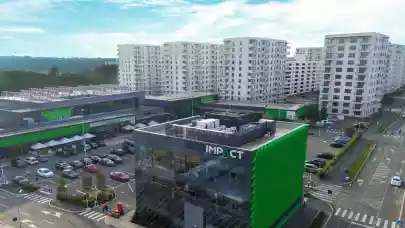
As development activity has slowed down, the focus is shifting to managing the existing stock across the whole commercial real estate market. Owners and other stakeholders have to adapt rapidly to serve changing demand from occupiers, said Benjamin Perez Ellischewitz MRICS, Principal at Avison Young in Hungary, while answering Property Forum’s questions at Mipim in Cannes.
What is the mood you’re getting during meetings this year?
The mood is quite okay but most people are still in a “wait-and-see” mode, I would say. Based on the conversations I’ve had; everybody is expecting the market to become a bit more active by summer, so I expect a quiet first half of 2024.
What is it that people in a “wait-and-see” mode are waiting for? Simply interest rates to drop or is it more complicated than that?
The interest rate cut is what everybody is waiting for. It's always the same story where investors want to buy at the bottom – and they want to make sure that we are the bottom. So this the mindset the investment market is in for now.
An interest rate drop will help as a psychological factor signalling the new cycle. It will not be a 200 bps drop and it will not dramatically change the numbers but it will signal that we’ve passed the “worst part”.

Benjamin Perez-Ellischewitz MRICS
Principal
Avison Young in Hungary
Not a lot has happened in the Hungarian investment market during the past year. What do you expect to see this year?
Last year was a tough year in terms of investment volumes in Hungary but the same drop happened in all European markets, including the core ones that were also down 60-65%.
I think Hungary has always had a special case of perception. Some investors say that it’s not a market for them, more so than before. But many investors are still here, looking at the fundamentals, the type of assets they can secure and the pricing, and they remain interested. These investors will remain open-minded and are still interested in locations like Hungary.
What kind of assets are they most interested in right now?
Logistics and living remain at the top of the agenda. In logistics, we’re still witnessing a strong appetite from investors and a robust development activity. As we don't have institutional residential products in Hungary, some investors are moving towards hotels. The segment has regained momentum due to the interest of both operators and investors on the back of a robust touristic trend. Globally, there is certainly a backlash on offices but the Budapest market is suffering much less than other markets in terms of office leasing activity. Take-up has recovered well since Covid and demand is there but it is changing. Central locations rich in amenities are performing better with tenants. Developers and landlords have to adapt, upgrade, and make greener offices.
In terms of the Budapest office market, what are your forecasts for the year ahead?
The pipeline is drying up as for now it is very difficult for developers to secure financing. The majority of the projects which are under construction are already mostly pre-leased. That gives some comfort that the vacancy will not increase dramatically anymore.
What do you see landlords focusing on these days? Are they pushing the retrofitting of assets or not enough?
I think people are becoming more and more conscious that they have to do something about their older assets, which have aged in terms of technology and are sub-efficient. Some occupiers are exercising quite a strong pressure on landlords saying, “I can't move to your building if it has dated technology, and you need to upgrade it and make it more sustainable – then I might renew, but if you don't do anything, I will go away”. The pressure is coming from the banks too. Some banks have made it clear that they will only finance green buildings or buildings with a very clear path to green. It might take 1-3 years to upgrade but the banks will only finance in case the debtor is taking on the commitment to upgrade.



